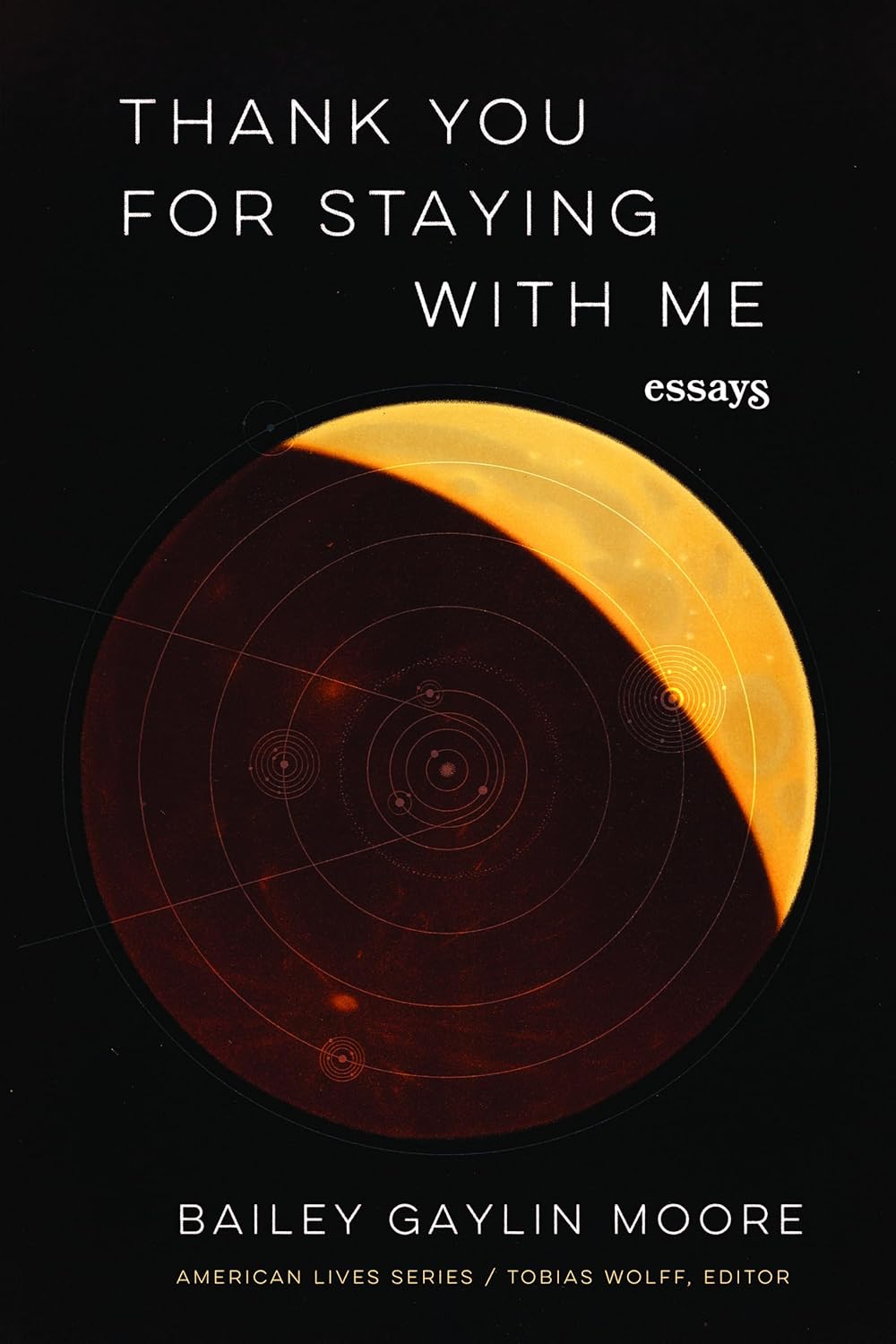Bailey Gaylin Moore
University of Nebraska Press ($21.95)
An essay collection both poignant and plainspoken, Bailey Gaylin Moore’s Thank You for Staying with Me is concerned with forgetfulness: how she is pushed to forget and re-remember traumatic events in her past. As Moore writes in a foreword: “For a long time, I wished I had possessed some kind of step-by-step how-to guide for Being and navigating this world, but I guess the point of all this existential dogshit is to make our own blueprints.” This “blueprint” motif carries over into several chapters with titles drawn from instruction manuals (“How to Hold a Baby,” “How to Be a Daughter,” etc.), however Moore’s instructions are not guidance for the reader but rather a record of her method of detangling, bit-by-bit, a discombobulated knot of time—one that opens to reveal the absence at its center, which the author claims and renames on her own terms.
“Count The Beats” elaborates how absence haunts the Missouri countryside where Moore grew up: “The back roads here smell like forgotten slaughterhouses, where piglets cry for their long-gone mother and a father they never knew.” Hushed tones and cryptic language disguise the violence Moore witnessed. Ashamed of the attention that her own developing body could draw, she wants to become invisible in middle school: “I’d play the role of a jock, hiding underneath loose T-shirts as I inevitably became the woman I always thought I wanted to be.”
Later, as teenagers in a church youth group confess to sins such as smoking or drinking, Moore will say, “I lost my virginity, but I didn’t mean to,” unaware of how to communicate the starker truth: “A man raped me.” She wraps the trauma of rape in the facade of “sin,” something digestible to those around her with a fully understood “center”—and something resolvable by way of forgiveness. However, she is missing from her “confession,” both figuratively and literally: “I wasn’t there for my own testimony. I couldn’t stand to hear those words spoken by a pastor who, days prior, had edited my version to look like a call for forgiveness, a lesson of obedience and chastity.”
For Moore, being a woman often meant erasing herself and putting a self already prepared for her in its place: “I don’t remember much from this time, so there’s a hole in the narrative—a noticeable jump in time. Even in my thirties, I will still be working on forgiving this past self, trying to fill in the gaps.” These gaps may result from a societal assumption that a woman’s story belongs not to her but to the misogynistic forces which determine the dominant narrative (for example, the idea that her rapist was “just being a boy”). The incomplete narrative of self that results is characterized by, as Marcel Proust writes in The Fugitive (as translated by C. K. Scott Moncrieff), a “fragmentary, irregular interpolation in my memory—like a thick fog at sea which obliterates all landmarks.” Yet as this fog forces its way in and tries to occlude certain details of her life, Moore pushes back:
When I wrote about being assaulted at fourteen, I imagined it was more uncomfortable for the reader because of my inclination toward impassivity. Or: I thought it was more uncomfortable for the reader until an essay about my rape was published. The overwhelming accessibility of what happened to me at fourteen forced me to tear down a partition I constructed between myself and the world, as well as the wall I built between myself and self.
Here Moore gets at a key struggle in these essays: whether to allow herself to be defined by the exterior world or to engage her interiority in a dialectic with it. The latter choice requires that “uncomfortable” details be shared when discussing traumatic events, and generally, people want to feel comfortable, accepted, at home; however, rather than defining home as the tautological end of a journey, Moore imagines home in terms of moving toward something—not a topographical destination but an opening onto an already existing reality, or the untying of a knot to reveal an absence. While attempting to escape from trauma is understandable, Moore implies we should consider moving toward the past as a way to eventually overcome it:
“Hegel doesn’t want to reject or forget the past,” your philosophy professor said. . . . “We’re only capable of growth if we know what we are growing from.”
This looks like a spiral, this preservation being raised, inflated, and he drew a long seashell on the board, the lines twisting together as he reached the top.
One could visualize Thank You for Staying with Me in the shape of a seashell, too, moving simultaneously toward and away from a center while Moore transforms the gaps in her memory from nodes of panic to active spaces of re-creation. As Moore’s son says to her at one point, “We’re not dead, Mom. We’re just lost.” Her essays, which rawly address subjects like motherhood, assault, and sexism but also include reveries on the cosmos, vignettes on nature, and appreciative moments of common humanity, encourage readers to spend less time trying to bring everything to a center and pay attention instead to life’s continuous surprises.
Click below to purchase this book through Bookshop and support your local independent bookstore:
Rain Taxi Online Edition Summer 2025 | © Rain Taxi, Inc. 2025

